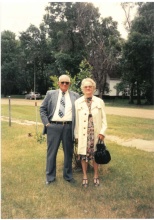
Although a few of Myrl Holida’s loved ones have been cornea donors, Holida never thought he would be on the other side of the process.
But in May 2023, Holida underwent a corneal transplant at University of Iowa Health Care University Campus to correct Fuchs Dystrophy, a disorder that causes the cornea to become clouded over time.
Although Fuchs Dystrophy can be inherited, Holida says he’s not aware of anyone else in his family who has been diagnosed with the disorder. In fact, Holida donated his father’s corneas in 1992.
“We had never talked about donation with my dad, but we all knew that was something he would do,” Holida says.
Holida’s father had kidney cancer, but that did not preclude donation. In fact, patients with most forms of cancer are eligible to be cornea donors.Holida has worked in the transplant field himself. A physician assistant since 1987, he has experience assisting with pediatric bone marrow transplants. Before going back to school to become a physician’s assistant, he worked in cardiovascular research. Currently, he works part-time at the University of Iowa’s Division of Medical Genetics and Genomics on rare enzyme deficiency cases.
Holida’s wife, Denise, also is in the medical field, and works at University of Iowa Health Care as a manager of neonatal nurse practitioners.
“Both of my wife’s parents donated corneas,” Holida says.
Holida says his doctor, Mark Greiner, MD, who also is the medical director of Iowa Lions Eye Bank, has told him that he will have to have a corneal transplant on his other eye in another year or so.
“My vision right now is quite good,” Holida says. “It’s about 20/15 corrected.”
